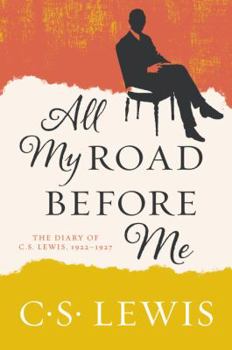All My Road Before Me: The Diary of C. S. Lewis, 1922-1927
Select Format
Select Condition 
Book Overview
A repackaged edition of the revered author's diary from his early twenties--a thought-provoking work that reveals his earliest thinking about war, atheism, religion, and humanity. While serving his country in the Great War, C. S. Lewis' the great British writer, scholar, lay theologian, broadcaster, and Christian apologist--made a pact with a close friend and fellow soldier. If one of them died, the survivor would take care of his family--a promise Lewis honored. Developing a deep friendship with his fallen friend's mother, Jane King Moore, Lewis moved into the Moore household after the war. Returning to Oxford, the twenty-three-year old Lewis--then a staunch atheist--struggled to adapt to life in post-war England. Eager to help the tormented young man, Jane encouraged him keep a diary of his day-to-day life. Those reflections are collected in this illuminating journal. Covering five remarkable years in Lewis's life, All My Road Before Me charts the inspirations and intellectual and spiritual development of a man whose theology and writing--including Mere Christianity, The Screwtape Letters, The Great Divorce, The Chronicles of Narnia , and many other beloved classics--has had immense influence on the Christian world.
Format:Paperback
Language:English
ISBN:0062643584
ISBN13:9780062643582
Release Date:February 2017
Publisher:HarperOne
Length:672 Pages
Weight:1.10 lbs.
Dimensions:1.2" x 5.1" x 8.0"
Customer Reviews
1 rating
C. S. LEWIS
Published by Thriftbooks.com User , 24 years ago
A book with such a dry-sounding title will necessarily cause the prospective reader, even the fans of CSL, to wonder whether it is worth its price and the effort of reading it. To answer that question, I would say that the book is of real value to both the diehard Lewisophile, and the researcher of well-known characters from that period of Oxford such as John Betjeman.The period covered is from the time of his study for the second of his three degree subjects, to the second year of his English Fellowship at Magdalen. On eventually being offered a position, he was asked would he mind teaching some philosophy as well as English. In a letter to his father, he records that by that time he would have `agreed to coach a troupe of performing bagbirds in the quadrangle'.His main motive for keeping the diary was that the entries were read aloud to his companion Mrs Moore, who kept house for him. If he allowed the diary to lapse, she would prompt him to start again. This is all to the good in terms of a candid insight into his life, as publication would be the last thing he would have expected. The published text is well edited, and generally gets the flavour of his domestic and college life. The general range and depth of his intellectual life is captured particularly well, with Shakespeare, Sigmund Freud, Havelock Ellis, and a variety of philosophical savants (now mostly forgotten) being the daily diet.There are some surprises in the text. I was surprised at the extremely social nature of his life at this time. Far from a life of solitary study, the steady stream of houseguests, companionable walks, and visits to the theatre or musical performances form a large part of the normal routine. Without doubt the most horrifying section is his account of their attempt to help `The Doc', who goes mad shortly before his death. This reminded me of the later Lewis who was to write `A Grief Observed' - an account of his wife dying, and his coming to terms with it - a rare blend of compassion and self-analysis. At the end of the book is a fascinating but rather uncompromising set of nine pen-portraits of his Magdalen colleagues. These are private notes, and not intended for publication, but we see how the lancet accuracy of his analysis is turned with equal facility on human nature or literary works. It explains why he could be unintentionally intimidating, and why he was not equally appreciated by all his colleagues.






